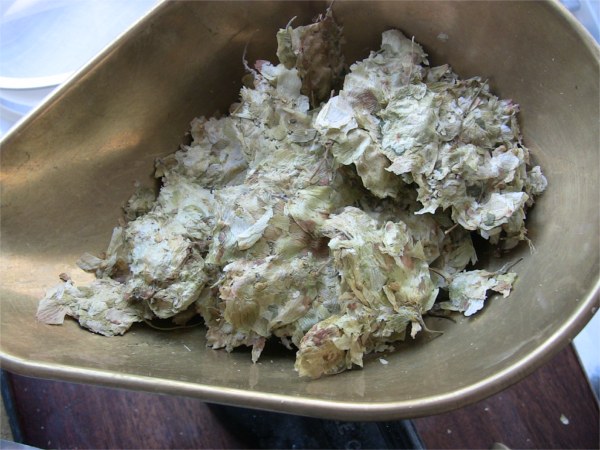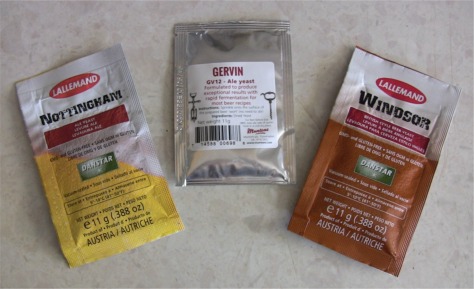Ingredients for All Grain Brewing

In grain brewing, we start with the basic raw materials for all true beers - malt, hops, yeast and water. In extract brewing, we used malt extract as the starting point - in grain brewing we go back one more stage, to produce the malt extract ourselves, in our mash tun.
There are a variety of different types of malts, not all of which are derived from barley - the traditional brewing crop. It's this variety that allows the grain brewer such control over the beer produced; you can choose from a huge catalogue of base malts, kilned, roasted, smoked malts and adjuncts to make almost any beer imaginable. Some of the more commonly-used grains are listed below.
Most grains need to be crushed before use, to expose the starch inside; the degree of crush is critical and I advise you to buy it ready crushed - it will still keep for a year without problem if stored correctly, and costs very little more. Some experienced brewers buy their own grain mills, but they're expensive and home-milling is not for everyone.
Grains for Brewing
Pale Malt
The bulk ingredient for English Ales and bitters, this is produced from English 2-row barley and comes in several varieties, of which Maris Otter is the most popular for brewing. It's also available in various colours (normal, pale, extra-pale) to allow you to control the colour of your beer. There are darker versions such as Mild Ale Malt, Amber Malt, Brown Malt, which are used for making Mild, Amber and Brown Ales respectively.
Lager Malt
As the name suggests, this is the bulk malt used in lager, and is made from continental 4-row barley. This malt has a higher nitrogen content than English pale malts, and requires a different approach in the mashing stage. A wide range of specialist lager malts are available to the serious lager brewer.
Crystal/Caramel Malt
These malts have been kilned after malting to caramelise the starch into sugar. Effectively, these malts are 'pre-mashed' for us, which is why they can also be used in extract brewing. They are used in smaller quantities (up to 10% of total grain bill) to add flavour and sweetness to a brew.
Roasted Malts
These are malts that have been roasted far longer than Crystal or Caramel malts so that they turn very dark in colour. They retain little sugar, and are used for colour and flavouring.
Other Malts and Grits
This is my catch-all section for malts made from crops other than barley, and other miscellaneous unmalted grains.
- Wheat Malt (provides a pleasant and unusual flavour)
- Wheat Flour (good for head retention in small amounts)
- Torrified Wheat (aids head retention)
- Roasted Barley (popular for making dry Irish Stouts)
- Flaked maize (has a characteristic flavour - use it for a bit of variety)
- Flaked rice (gives cheap strength, but little flavour - more at home in American lagers)
Hops

Hops provide bitterness to balance the sweetness of the malt and also act as a preservative. There are many varieties and availability varies from year to year, as new varieties are developed and old ones become uneconomical due to disease problems (the hop industry being driven by commercial brewers, of course).
The bittering power of a hop depends largely on the percentage of a substance called 'alpha acid' that it contains. Any hops from a decent supplier should have this figure clearly stated on the pack, and it will vary between different hop varieties and also from season to season for the same hop variety. The percentage alpha acid is used when formulating recipes, to ensure the correct and consistent level of bitterness is achieved in the finished beer, so it's very important to know what it is.
Hops are categorised as follows: -
Bittering Hops
Used early in the boil to provide the basic level of bitterness in the beer e.g. Bullion, Magnum.
Aroma Hops
More expensive, but with better flavour characteristics, aroma hops are used later in the boil or for dry hopping in the cask e.g. East Kent Golding, Fuggle, Saaz.
Dual Purpose Hops
As the name suggests, these can be used for either Bittering or Aroma e.g. Challenger, Nelson Sauvin.
Yeast

We already know from brewing with kits and malt extract that yeast turns sugar into alcohol. As well as alcohol and carbon dioxide gas, the yeast also gives off flavour compounds that are detectable in the finished beer. For this reason, the yeast can have a significant effect on a beer's flavour, even becoming the predominant flavour; for example, the estery flavours important to many English Bitters are derived from the yeast and a Lambic beer would be unrecognisable as such without the correct yeast. Therefore it is important to choose an appropriate yeast strain for the style you are producing.
While there are many excellent dried brewing yeasts available, allowing you to make a range of beer styles, not all strains do so well in dried form. For this reason, home brew suppliers such as Wyeast and Whitelabs offer a wide range of liquid yeasts, with equivalents for most of the yeasts used in commercial breweries worldwide. Although expensive, these yeasts are well worth considering once you step up to the level of grain brewing. There are even a growing number of home brewers who culture their own yeasts from 'slants', which are much cheaper to buy than liquid yeast packs and can be split and re-cultured many times.
Water
As mentioned in the extract brewing pages, even strong beers are over 90% water, and this can be an even more important consideration in grain brewing, as the mineral content of your water can directly affect conditions in the mash tun (as you will see if you read on to 'Mashing'). Don't worry too much at the start though, because as with extract brewing you can still use most domestic water supplies without a problem..
Copyright Information: This site designed by Jim Dunleavy

